Key takeaways:
- Pro-life advocacy emphasizes understanding emotional and personal stories behind differing viewpoints to foster empathy and compassion.
- Ethical mindfulness in discussions can lead to deeper understanding and a more respectful dialogue about sensitive topics like pro-life issues.
- Effective communication strategies, such as active listening and using “I” statements, can transform confrontational dialogues into constructive conversations.
- Cultivating compassion in activism encourages connecting with others’ experiences to promote understanding rather than winning arguments.
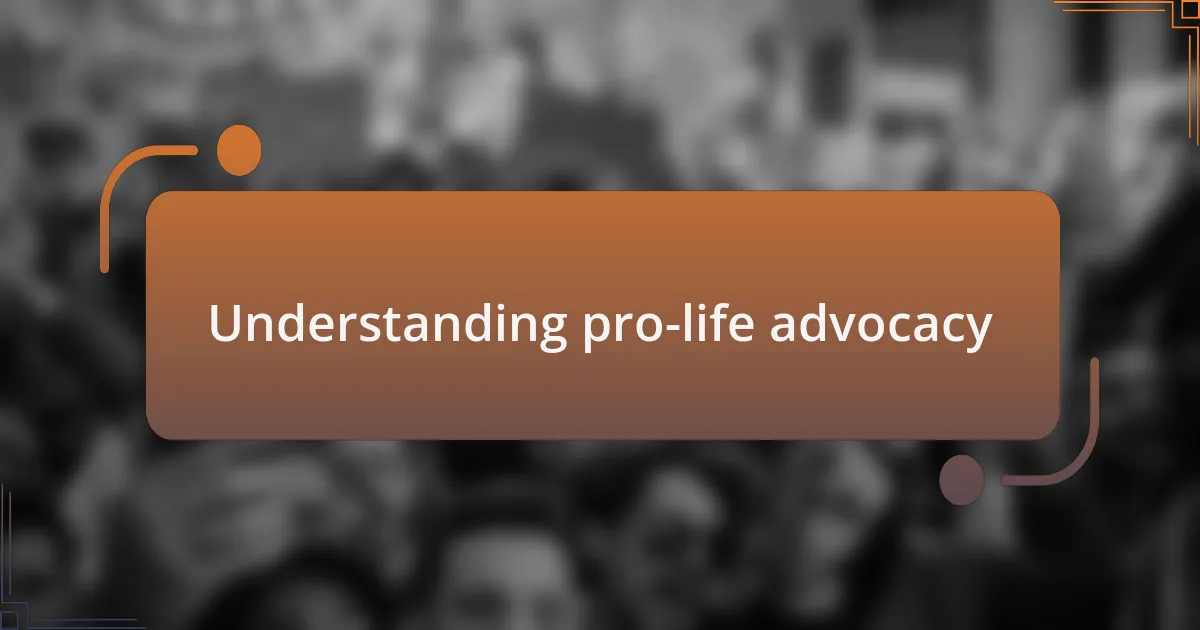
Understanding pro-life advocacy
Pro-life advocacy centers on the belief that every human life, from conception to natural death, holds intrinsic value. I remember when I first encountered this idea in a community discussion, where someone passionately described how their perspective shifted after learning about the stories of those affected by abortion. It made me realize that understanding the emotional and personal aspects behind each stance is crucial in any dialogue.
What struck me deeply was the shared experience of individuals who have faced difficult decisions regarding pregnancy—stories of joy, regret, and everything in between. Hearing those narratives can challenge our own views and force us to consider the human element in the pro-life conversation. Isn’t it fascinating how perspectives can evolve through empathy and understanding?
When we advocate for life, we’re not merely defending a stance; we’re engaging with a spectrum of experiences that encapsulate hope, love, and sometimes heartbreak. It’s vital to approach this topic with sensitivity, compassion, and an open heart, as I’ve learned through discussions with friends who have had their beliefs transformed by real-life experiences. How can we truly engage with pro-life advocacy if we overlook the deeply personal journeys that shape those beliefs?
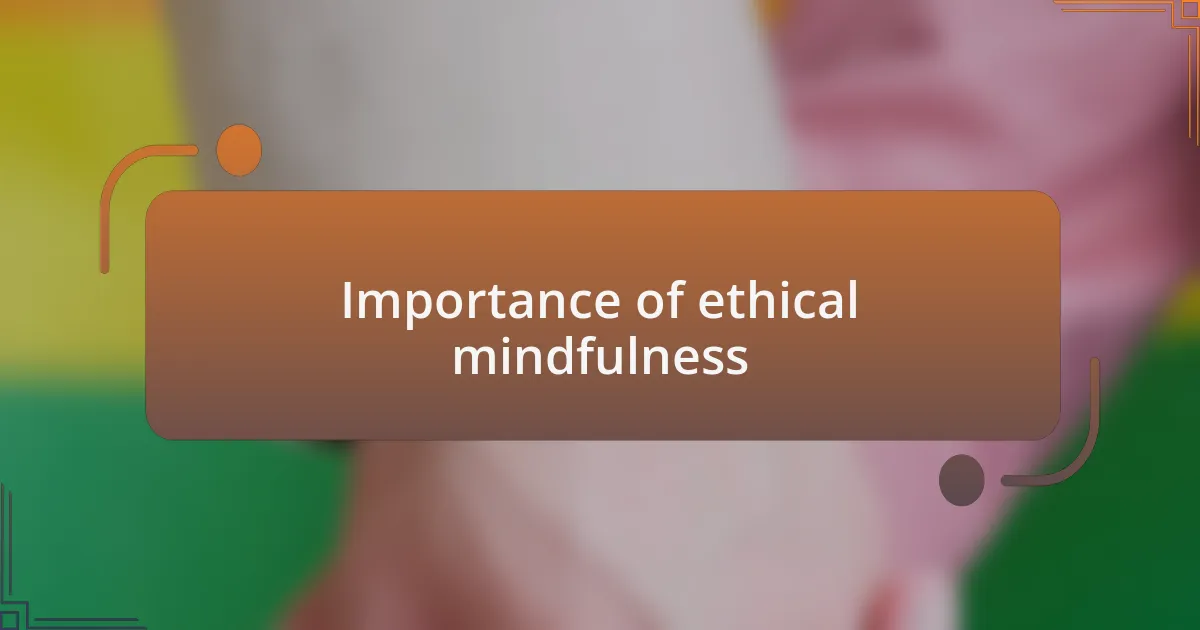
Importance of ethical mindfulness
Ethical mindfulness is crucial in understanding the pro-life advocacy journey. I recall a moment during a workshop where we practiced active listening. As I listened to a woman share her story of a difficult pregnancy decision, I recognized how my own biases started to melt away, replaced by a genuine empathy for her situation. This experience taught me that when we cultivate mindfulness, we can better appreciate the nuances of life decisions and the myriad emotions involved.
Being ethically mindful allows us to navigate sensitive conversations with care. In my personal encounters, I’ve often found that individuals are more receptive when we acknowledge their feelings and circumstances. For instance, during a heated debate, I chose to ask questions rather than assert my opinions. This approach not only fostered a deeper understanding but also created a safe space for dialogue where vulnerability and honesty could flourish. How often do we miss these opportunities when we fail to be present with others?
Moreover, ethical mindfulness equips us to advocate with integrity. It’s easy to champion a cause in abstract terms, but I believe we must ground our discussions in real human experiences. I remember discussing the impact of abortion on mental health with a friend who had been directly affected; her insights were profound and reminded me that advocacy is more than just a stance—it’s about honoring all stories, even those that challenge our beliefs. Isn’t it our responsibility to ensure that every voice is heard and respected in this important conversation?
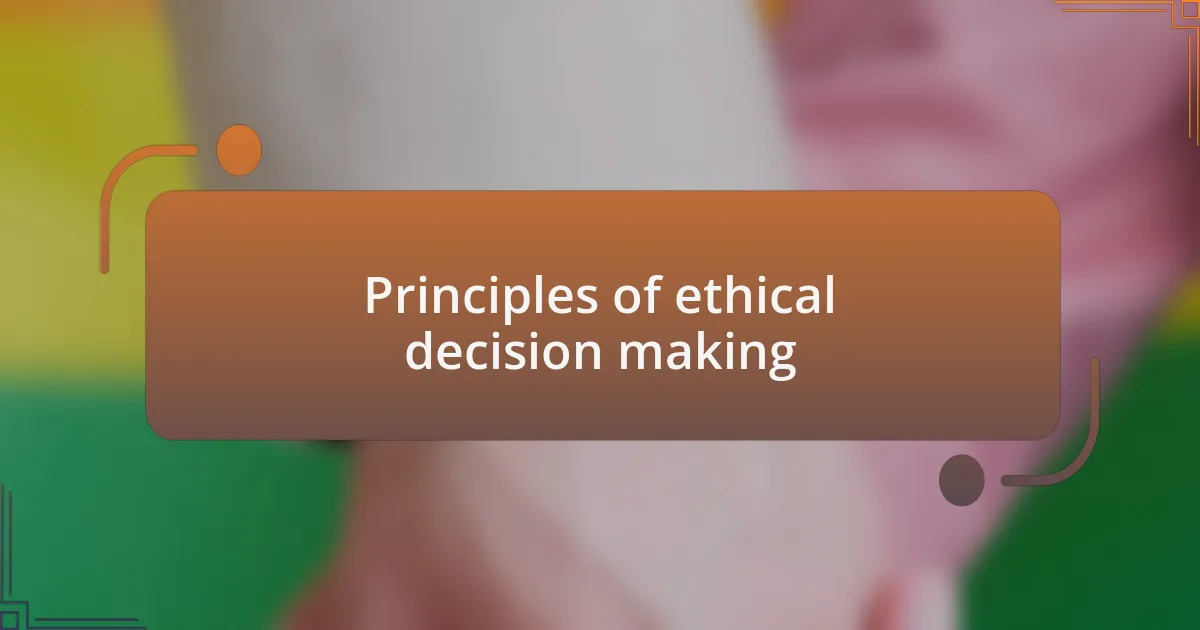
Principles of ethical decision making
Ethical decision making hinges on a few foundational principles that guide us. One key principle is to consider the impacts of our choices not just on ourselves, but on others involved. I remember a time when I faced a decision that would affect not only my life but also the lives of those around me. That realization pushed me to weigh not just the immediate outcomes, but also the long-term effects, sparking a deeper understanding of the interconnectedness we all share.
Another essential aspect is honesty—both with ourselves and with others. I often find that being transparent about my motivations leads to more meaningful discussions. For example, when I openly shared my own struggles with understanding different perspectives, it prompted others to do the same. Have you ever noticed how vulnerability can break down barriers? This approach allows us to confront our biases and emerge as more empathetic advocates.
Lastly, we must cultivate a sense of responsibility in our decision-making process. This principle became especially clear to me during a community forum where we discussed various pro-life stances. I was struck by how many people expressed differing opinions yet shared a common goal: to support individuals facing tough choices. Reflecting on that gathering made me realize that our duty is to seek understanding rather than simply to win an argument. When we embrace responsibility, we become more effective voices for change.
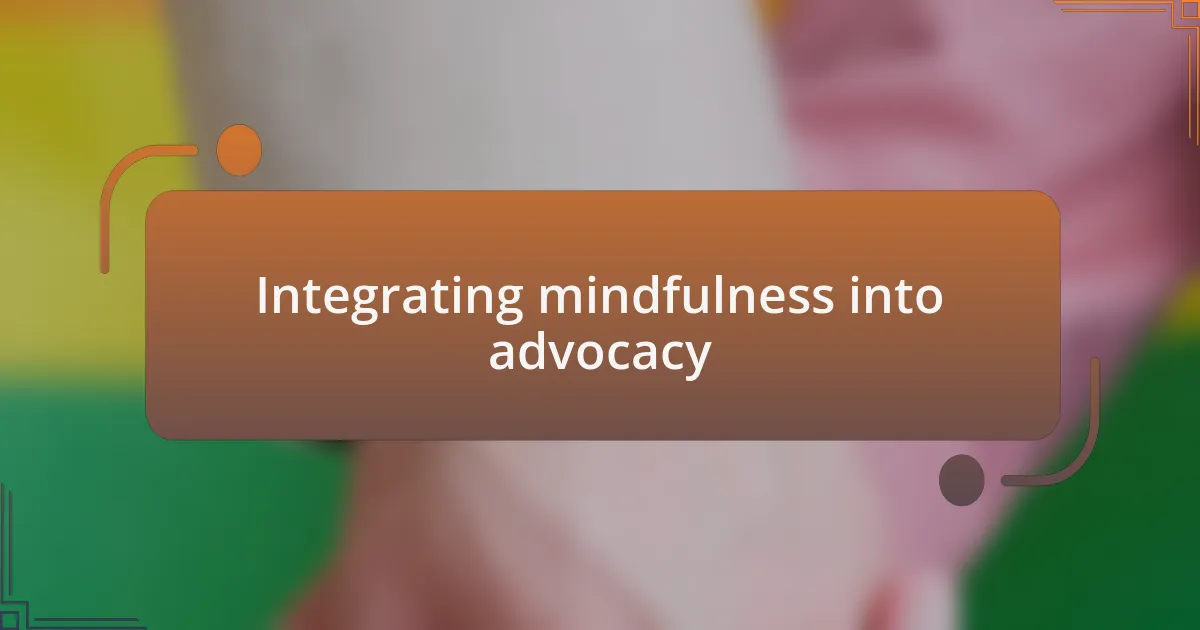
Integrating mindfulness into advocacy
Mindfulness can play a transformative role in advocacy, allowing us to approach sensitive topics with a greater sense of compassion and clarity. I recall an advocacy meeting where emotions ran high, and tensions escalated quickly. In that moment, I chose to practice deep breathing—taking a pause to center myself. This simple act helped me respond thoughtfully rather than react impulsively, demonstrating how mindfulness can create space for more constructive dialogue.
Engaging in mindfulness also encourages us to listen actively and empathetically. During a recent discussion on pro-life issues, I made a conscious effort to listen more than I spoke. I noticed that when I truly focused on understanding others’ feelings and perspectives, it opened up avenues for connection that weren’t there before. Have you ever found that when you really hear someone out, it fosters a deeper sense of trust? It’s remarkable how mindfulness can facilitate genuine exchanges that might otherwise turn confrontational.
Incorporating mindfulness into our advocacy can lead us to more authentic interactions and more profound insights. I once participated in a workshop where we spent time reflecting silently before discussing our viewpoints. That stillness allowed me to tap into my emotions and thoughts more deeply, leading to discussions that were both impactful and respectful. By allowing ourselves those moments of reflection, we equip ourselves to advocate not just more effectively, but also more ethically.
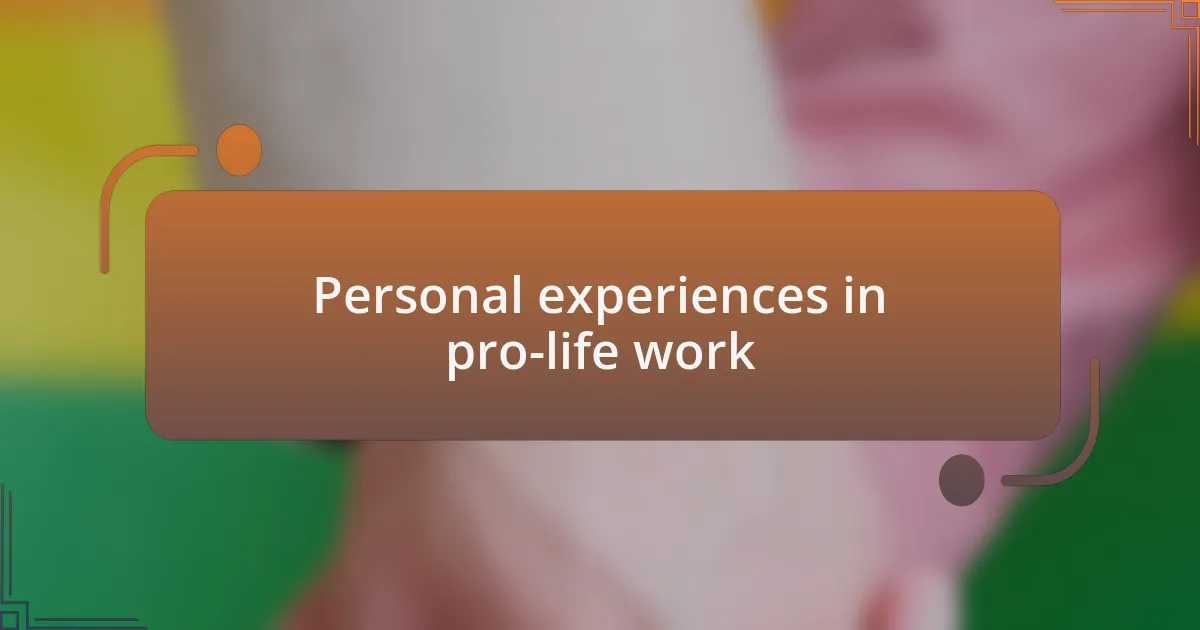
Personal experiences in pro-life work
One of my most poignant experiences in pro-life work occurred during a community outreach event. I vividly remember standing at a booth, ready to engage with anyone who approached. A woman came up, visibly distressed, her questions laced with fear and uncertainty. In that moment, I felt an overwhelming surge of compassion, and instead of presenting statistics or arguments, I chose to simply listen. This choice created an environment where she felt safe to share her story, highlighting how pro-life advocacy can be about nurturing connections rather than just conveying a message.
In another instance, I attended a rally where emotions were palpable and opinions clashed. I was struck by how easily conversations escalated into heated exchanges. I’ve found that taking a step back to gather my thoughts often leads to more productive discussions. When I spoke up, I focused on framing my words with patience and understanding. Reflecting on that rally, I can’t help but wonder: What if more advocates approached advocacy with this mindset? Would we be able to shift the narrative from divisiveness to dialogue?
Then there was a volunteer training session that profoundly shaped my perspective. We were each asked to share our hopes for the future of the pro-life movement. As I listened to others express their visions, I felt a swell of pride and purpose. It became clear that our individual experiences and emotions were not just personal stories; they formed a powerful tapestry of shared commitment to life. I realized that my journey in pro-life advocacy is not just about standing firm in my beliefs, but also about fostering a community grounded in empathy and love. Isn’t that ultimately what we should strive for?
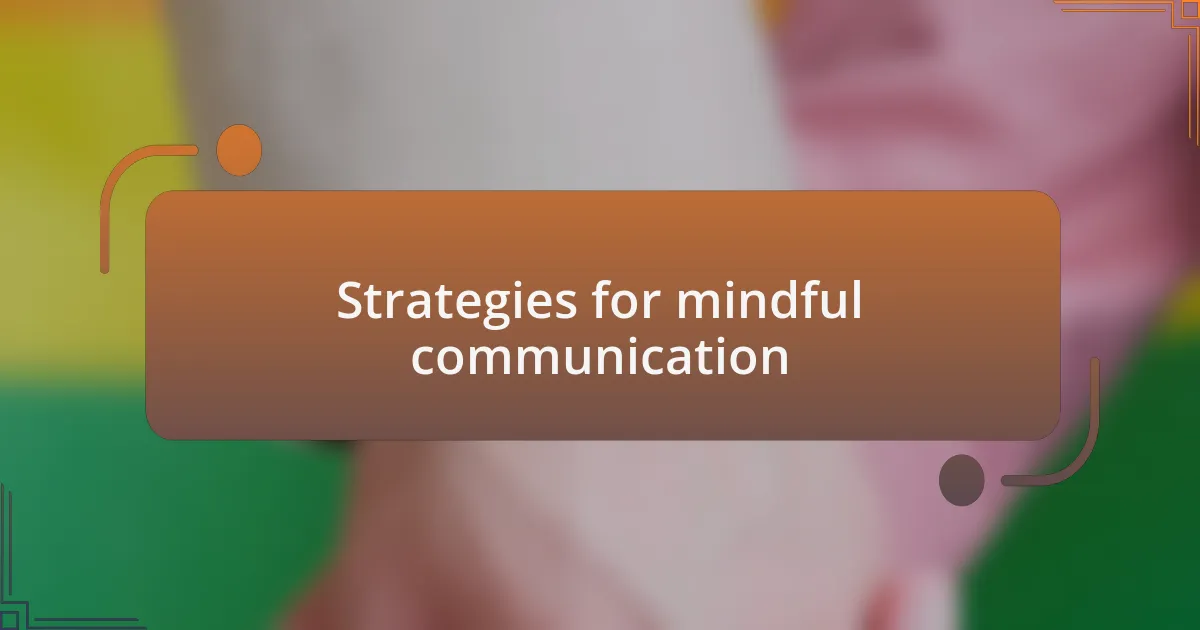
Strategies for mindful communication
When I think about mindful communication in the context of pro-life advocacy, one strategy stands out: approaching discussions with genuine curiosity. I recall a moment when I was chatting with a friend who held opposing views. Instead of rushing to defend my position, I asked her about her experiences that shaped her beliefs. This not only deepened our conversation but also allowed me to understand her perspective better. Have you ever noticed how asking open-ended questions can transform a challenging dialogue into a mutual learning experience?
Another effective strategy is to practice active listening. I remember a training session where we simulated difficult conversations. I realized that when I truly listened, I could respond more thoughtfully rather than reacting emotionally. In one of those role-plays, my partner shared a heartfelt story that shifted my perception. It underscored the importance of giving others our full attention and respecting their feelings. How often do we miss opportunities to connect because we’re too focused on delivering our message?
Finally, I’ve found that using “I” statements can help convey my feelings without sounding confrontational. For example, when discussing sensitive topics, I often say, “I feel concerned when I hear…” rather than making accusatory “you” statements. This slight shift in language can significantly ease tension and foster understanding. Have you tried this technique? It’s remarkable how those few words can change the dynamics of a conversation, making it more about sharing rather than defending.
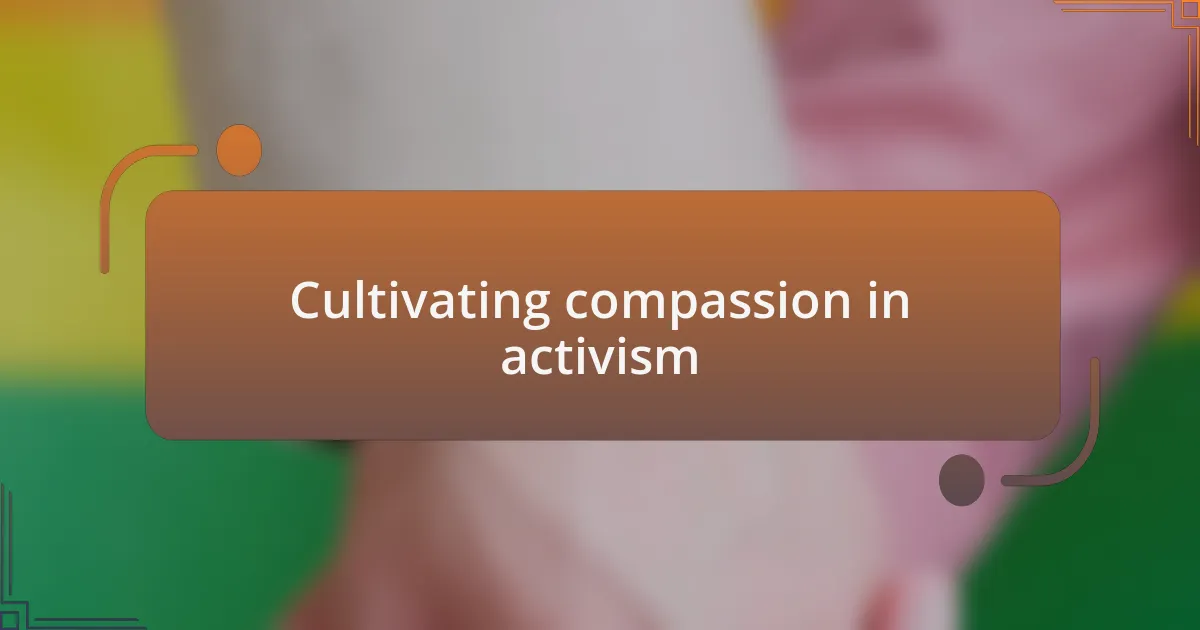
Cultivating compassion in activism
Cultivating compassion in activism starts with recognizing the common humanity we share with those who disagree with us. I remember volunteering at a local crisis center where I encountered individuals from all walks of life. Each person brought their own story and emotions, and I discovered that approaching them with compassion allowed me to connect on a deeper level. Have you ever taken a moment to consider what someone else might be going through? It’s enlightening to realize that our struggles are often intertwined.
Additionally, I’ve learned the power of empathy during community outreach events. At one gathering, I met a young woman whose journey was marred by hardship and confusion. Listening to her speak about her experiences not only moved me but also reminded me that compassion can pave the way for meaningful dialogue. How often do we allow ourselves to immerse in others’ stories? It’s through this immersion that we nurture a more compassionate heart in our advocacy.
Ultimately, what resonates deeply with me is the idea that compassion isn’t a passive state but an active choice. In moments of disagreement, I strive to remind myself that my goal isn’t to win an argument but to promote understanding. Isn’t it essential to foster environments where love and empathy guide our conversations, even when topics are divisive? My journey shows that by choosing compassion, we can create a ripple effect that transforms not only our conversations but also the culture around activism.